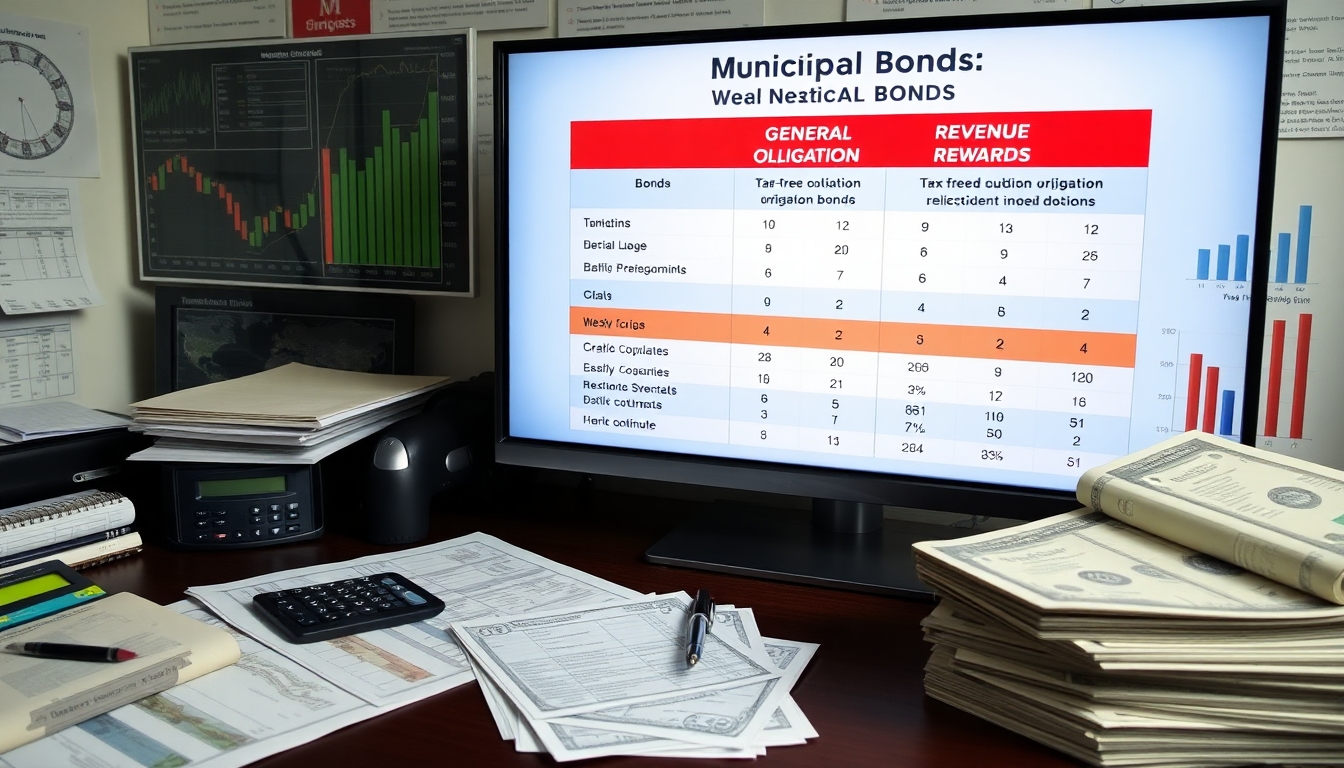
Are you a high-income earner searching for a smart way to invest your money while enjoying tax benefits? Look no further than municipal bonds. These investment vehicles are like the hidden gems of the financial world, offering tax-free interest that can be a boon for those in higher tax brackets. But what exactly are municipal bonds, and why are they such a great choice for savvy investors?
Municipal bonds, often called “munis,” are debt securities issued by local governments or their agencies. They’re like an IOU from your city or state, promising to pay back the borrowed amount with interest. The real kicker? The interest earned is typically exempt from federal taxes, and in some cases, state and local taxes too. This makes them particularly attractive to high-income earners who want to keep more of their hard-earned money.
But why should you, as a high-income individual, consider munis over other investment options? Well, it’s all about the tax-free interest. Imagine earning interest without the IRS taking a chunk out of it. It’s like finding a secret passage in a video game that leads to a treasure chest. For those in the top tax brackets, this can mean significant savings and a better return on investment.
Incorporating municipal bonds into your investment portfolio is like adding a sturdy foundation to a house. They provide stability and can help balance out riskier investments. So, if you’re looking to invest wisely and keep Uncle Sam at bay, municipal bonds might just be the perfect fit for your financial strategy.
What Are Municipal Bonds and How Do They Work?
Municipal bonds, often affectionately called “munis,” are like the unsung heroes of the investment world. But what exactly are they? Simply put, municipal bonds are debt securities issued by local governments, such as cities, states, or counties. They’re a way for these entities to raise money for public projects like schools, highways, or hospitals. Think of them as a community’s promise to pay back borrowed money with interest. Pretty straightforward, right?
Now, let’s get into the nitty-gritty of how these bonds actually work. When you invest in a municipal bond, you’re essentially lending money to the issuing government. In return, they pay you interest, typically semi-annually. The interest rates can vary, but here’s the kicker: the interest income is usually tax-free at the federal level. This is a big deal for high-income earners looking to keep Uncle Sam at bay.
But wait, there’s more! Depending on where you live, you might also dodge state and local taxes. It’s like finding a hidden treasure in your backyard. However, not all munis are created equal. Some are backed by the full faith and credit of the issuing authority, while others are supported by revenue from specific projects. This is where understanding the nuances of municipal bonds becomes crucial.
So, are you ready to dive into the world of munis? It might sound a bit complex, but with a little digging, you’ll find that municipal bonds can be a rewarding addition to your investment portfolio. They offer a unique blend of safety, tax advantages, and community support. And who doesn’t love the idea of investing in their own backyard?
Tax-Free Interest: Federal and State Benefits
Imagine earning interest without worrying about taxes nibbling away at your returns. Sounds dreamy, right? Well, that’s the charm of municipal bonds for high-income earners. These bonds are like a secret passageway to tax-free income. But how does it work?
Municipal bonds, often called “munis,” offer a unique advantage: the interest earned is typically exempt from federal income tax. This is a huge deal, especially if you’re in a high tax bracket. Let’s say you’re earning a handsome salary. The last thing you want is Uncle Sam taking a bigger slice of your pie. With munis, you keep more of what you earn. It’s like having a protective shield over your investments.
But wait, there’s more! If you invest in municipal bonds issued by your home state, you might dodge state and local taxes too. It’s like getting a VIP pass to the tax-free club. Here’s a quick example: if you live in California and buy California municipal bonds, the interest might be free from state taxes. It’s a double whammy of tax benefits.
However, it’s crucial to understand the fine print. Not all municipal bonds are created equal. Some may be subject to the alternative minimum tax (AMT). So, it’s wise to do your homework or chat with a financial advisor. But for many, the tax perks of munis are a game-changer. They offer a blend of stability and tax efficiency, making them a smart choice for those looking to maximize their income while minimizing their tax bill.
Risks and Rewards of Investing in Munis
Investing in municipal bonds, or “munis” as they’re often called, can feel like walking a tightrope. On one side, you’ve got the allure of steady returns and tax-free income. On the other, there’s the potential for unexpected pitfalls. So, how do you balance the two? Let’s dive into the risks and rewards of investing in these intriguing financial instruments.
First, let’s talk about the rewards. Munis are known for their tax-free interest. That’s right, the interest you earn is often exempt from federal taxes, and sometimes even state and local taxes if you live in the issuing state. This makes them particularly attractive to high-income earners looking to keep Uncle Sam’s hands out of their pockets. Moreover, munis are generally considered safer than other bonds because they’re backed by the credit of a municipality. This can provide a sense of stability in a volatile market.
But don’t let the rewards blind you to the risks. Just like any investment, munis come with their own set of challenges. One major risk is credit risk. If a municipality faces financial trouble, it might struggle to meet its debt obligations. Then there’s interest rate risk. If rates rise, the value of existing bonds can fall, potentially leading to losses if you need to sell before maturity. It’s crucial to weigh these risks against the potential benefits.
So, how can you mitigate these risks? Diversification is key. By spreading your investments across different types of munis, you can cushion the impact of any single bond’s poor performance. Consider consulting a financial advisor to tailor a strategy that aligns with your risk tolerance and financial goals. Remember, while munis can be a valuable addition to your portfolio, they aren’t a one-size-fits-all solution. Weigh the risks and rewards carefully to determine if they’re the right fit for you.
How to Buy Municipal Bonds: ETFs vs. Individual Bonds
So, you’re thinking about diving into the world of municipal bonds, huh? Well, you’ve got two main routes to consider: ETFs and individual bonds. Let’s break it down. Imagine you’re at a fork in the road. One path leads you to ETFs, or Exchange-Traded Funds. These are like a big basket of bonds, all wrapped up in a neat little package. They offer a chance to spread your risk across multiple bonds, which can be a real lifesaver if one bond goes belly up. Plus, they’re super convenient. You can buy and sell them on the stock exchange just like a regular stock. Easy peasy, right?
Now, the other path takes you to individual bonds. This is where you buy bonds directly from the issuer or through a broker. It’s a bit like picking your own apples from an orchard. You get to choose exactly which bonds you want, and you know exactly what you’re getting. The interest payments, called coupons, come straight to you, which can be a nice steady source of income. But, there’s a catch. It requires a bit more effort and know-how. You need to do your homework on each bond’s creditworthiness and maturity date.
So, which path should you choose? It really depends on your investment style and goals. If you like simplicity and diversification, ETFs might be your jam. But if you’re into a more hands-on approach and enjoy the nitty-gritty details, then individual bonds could be your cup of tea. Either way, municipal bonds can be a solid addition to your investment portfolio. Just remember, like any investment, they come with their own set of risks and rewards. So, choose wisely!
Are Municipal Bonds Right for Your Portfolio?
Deciding whether municipal bonds, often called “munis,” are a good fit for your investment portfolio can feel like choosing the right tool from a toolbox. These bonds are not just any tool; they are a specialized instrument that offers tax-free interest, making them particularly appealing to high-income earners. But are they the right fit for you?
First, consider your financial goals. If you’re seeking steady income and a way to minimize your tax burden, munis might be your golden ticket. Their tax advantages can be a significant boon, especially if you’re in a higher tax bracket. Imagine having a stream of income where Uncle Sam takes a smaller bite. Sounds appealing, right?
Next, think about risk tolerance. While municipal bonds are generally considered safe, they are not entirely risk-free. There’s the credit risk—what if the issuer can’t pay back? Then there’s interest rate risk. If rates rise, the value of your bond might dip. It’s like sailing; smooth waters are great, but you need to be ready for the occasional storm.
Finally, consider how municipal bonds fit into a diversified investment strategy. They can be a solid part of a balanced portfolio, offering stability and predictability. However, they might not be the best choice if you’re chasing high returns. It’s like adding a reliable sedan to a garage full of sports cars. It won’t win races, but it gets you there safely.
In summary, municipal bonds can be a valuable addition to your portfolio if you value tax benefits and stability. But, like any investment, they come with their own set of risks and rewards. Weigh these factors carefully to see if munis align with your financial journey.
Frequently Asked Questions
- What exactly are municipal bonds?
Municipal bonds, often called “munis,” are debt securities issued by local governments or their agencies. They are used to fund public projects like schools, highways, and hospitals. When you buy a muni, you’re essentially lending money to the issuer in exchange for periodic interest payments and the return of the bond’s face value when it matures. It’s like being a silent partner in a local government project!
- Why are municipal bonds considered tax-free?
One of the major perks of municipal bonds is their tax-exempt status. The interest income earned from these bonds is typically exempt from federal income tax and, in some cases, state and local taxes too. This makes them particularly attractive to high-income earners looking to reduce their tax liability. It’s like getting a tax-free paycheck!
- What’s the difference between general obligation and revenue bonds?
General obligation bonds are backed by the full faith and credit of the issuing municipality, meaning they can use any available resources to repay bondholders. On the other hand, revenue bonds are repaid from specific revenue sources, like tolls from a bridge. Think of it as the difference between a government-backed loan and a project-specific investment.
- How can I purchase municipal bonds?
You can buy municipal bonds either individually or through exchange-traded funds (ETFs). Individual bonds offer direct ownership, while ETFs provide diversification by pooling various bonds together. It’s like choosing between a single scoop of your favorite ice cream or a sundae with multiple flavors!
- Are municipal bonds a safe investment?
While municipal bonds are generally considered safe, they are not risk-free. They come with credit risk, interest rate risk, and sometimes liquidity risk. However, they can offer stability, especially for those seeking predictable income. It’s like sailing on a calm sea with occasional waves.
